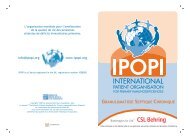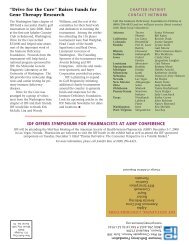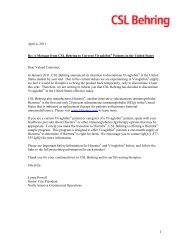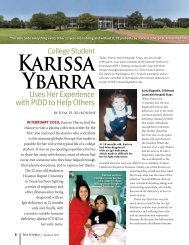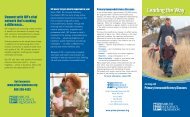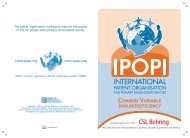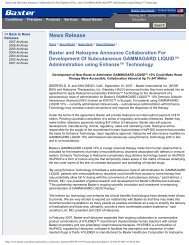IDF Patient & Family Handbook for Primary Immunodeficiency ... - IDFA
IDF Patient & Family Handbook for Primary Immunodeficiency ... - IDFA
IDF Patient & Family Handbook for Primary Immunodeficiency ... - IDFA
You also want an ePaper? Increase the reach of your titles
YUMPU automatically turns print PDFs into web optimized ePapers that Google loves.
Adults with <strong>Primary</strong> <strong>Immunodeficiency</strong> Diseases 121<br />
General Care<br />
It is important <strong>for</strong> any patient with a primary<br />
immunodeficiency to understand as much as he<br />
or she can about the workings of the immune<br />
system. Knowing when to involve medical<br />
professionals may mean staying healthier longer.<br />
To help maintain good health, there are things<br />
that patients can do in their everyday lives. In<br />
particular; good nutrition is of great importance.<br />
A balanced diet is essential <strong>for</strong> normal growth,<br />
development, body repair and maintenance, and<br />
especially important in preventing and fighting off<br />
disease. The general principles of good hygiene<br />
are also critical. Simple things like washing hands<br />
be<strong>for</strong>e meals and after using the restroom go a<br />
long way to prevent illness and should become<br />
routine habits. Most viruses, including the ones<br />
responsible <strong>for</strong> the common cold, are spread<br />
by unwashed hands. Any cuts or scrapes on<br />
the skin should be cleansed completely and any<br />
unusual redness or drainage should be reported<br />
to a physician so further treatment can be initiated<br />
promptly. Dental hygiene and regular dental<br />
check-ups are essential since some patients are<br />
more prone to tooth decay and gum diseases.<br />
Regular exercise helps to maintain optimal function<br />
of the body and is also a good means of stress<br />
relief <strong>for</strong> the mind.<br />
Specific treatment <strong>for</strong> the primary immunodeficiency<br />
disease should be coordinated between the<br />
patient and the healthcare team members. Each<br />
adult should do everything possible to foster good<br />
communication between themselves and their<br />
healthcare providers. <strong>Patient</strong>s are the only people<br />
who can honestly in<strong>for</strong>m their physician about how<br />
they feel. They are the ones who have experienced<br />
and know which treatments have truly been of<br />
benefit and which had not.<br />
The Newly Diagnosed Adult <strong>Patient</strong><br />
Some people who have been recently diagnosed<br />
have felt unwell <strong>for</strong> years, without any answer as to<br />
what was causing their illnesses and problems. In<br />
some cases, a diagnosis can actually be a relief <strong>for</strong><br />
the patient by finally providing that answer. However,<br />
at the same time, the newly diagnosed adult patient<br />
must face questions and problems that have already<br />
been faced by children who have grown up with<br />
these disorders. Feelings of self-pity and fear are<br />
quite normal, but must be identified and addressed<br />
promptly. Above all, it is important to realize that you<br />
are still the same person, only now you must come<br />
to terms with your diagnosis and treatment decisions<br />
to create a normal life <strong>for</strong> yourself.<br />
Self Education<br />
Self education is the key to caring <strong>for</strong> one’s own<br />
health. The more an individual understands about<br />
his or her primary immunodeficiency disorder, the<br />
more confident that person will feel, thus, making<br />
treatment decisions easier. Whether they grew<br />
up with the disorder or were recently diagnosed<br />
as adults, patients must ask questions, obtain<br />
educational materials and understand the realities<br />
of their deficiency. Most importantly, patients should<br />
read about their disorder and become in<strong>for</strong>med,<br />
getting involved with their own care. This can help<br />
produce a feeling of independence and control over<br />
their life. One way to begin this process is to seek<br />
out healthcare professionals who specialize in these<br />
disorders. Physicians who have little interaction<br />
with patients with primary immunodeficiency<br />
diseases may either overestimate the difficulties or<br />
underestimate the need <strong>for</strong> complete evaluation. It<br />
is important to ask as many questions as you can<br />
of a specialist. No question about your disorder is<br />
too trivial. New methods of investigating and treating<br />
these illnesses are being developed each year, and<br />
it is in the patient’s best interest, regardless of age,<br />
to find out what these are. Another way to gather<br />
knowledge is through contact with other individuals<br />
who live with primary immunodeficiency diseases.<br />
Immune Deficiency Foundation can put you in<br />
touch with another patient through its peer contact<br />
program. Talking to other patients and families is<br />
often helpful, and any feelings of isolation you may<br />
be experiencing can be dispelled.








